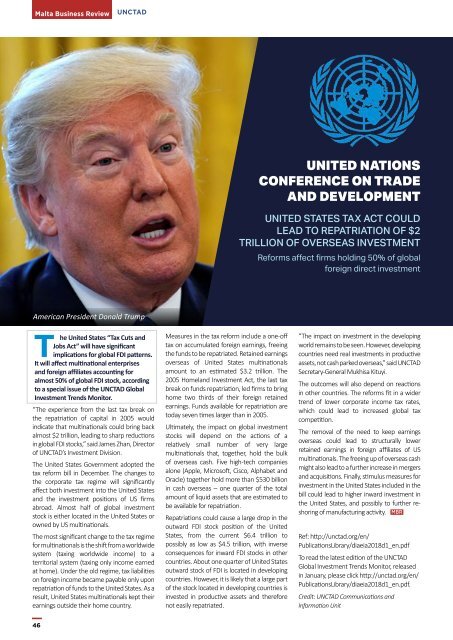You also want an ePaper? Increase the reach of your titles
YUMPU automatically turns print PDFs into web optimized ePapers that Google loves.
Malta Business Review<br />
UNCTAD<br />
UNITED NATIONS<br />
CONFERENCE ON TRADE<br />
AND DEVELOPMENT<br />
UNITED STATES TAX ACT COULD<br />
LEAD TO REPATRIATION OF $2<br />
TRILLION OF OVERSEAS INVESTMENT<br />
Reforms affect firms holding 50% of global<br />
foreign direct investment<br />
American President Donald Trump<br />
T<br />
he United States “Tax Cuts and<br />
Jobs Act” will have significant<br />
implications for global FDI patterns.<br />
It will affect multinational enterprises<br />
and foreign affiliates accounting for<br />
almost 50% of global FDI stock, according<br />
to a special issue of the UNCTAD Global<br />
Investment Trends Monitor.<br />
“The experience from the last tax break on<br />
the repatriation of capital in 2005 would<br />
indicate that multinationals could bring back<br />
almost $2 trillion, leading to sharp reductions<br />
in global FDI stocks,” said James Zhan, Director<br />
of UNCTAD’s Investment Division.<br />
The United States Government adopted the<br />
tax reform bill in December. The changes to<br />
the corporate tax regime will significantly<br />
affect both investment into the United States<br />
and the investment positions of US firms<br />
abroad. Almost half of global investment<br />
stock is either located in the United States or<br />
owned by US multinationals.<br />
The most significant change to the tax regime<br />
for multinationals is the shift from a worldwide<br />
system (taxing worldwide income) to a<br />
territorial system (taxing only income earned<br />
at home). Under the old regime, tax liabilities<br />
on foreign income became payable only upon<br />
repatriation of funds to the United States. As a<br />
result, United States multinationals kept their<br />
earnings outside their home country.<br />
Measures in the tax reform include a one-off<br />
tax on accumulated foreign earnings, freeing<br />
the funds to be repatriated. Retained earnings<br />
overseas of United States multinationals<br />
amount to an estimated $3.2 trillion. The<br />
2005 Homeland Investment Act, the last tax<br />
break on funds repatriation, led firms to bring<br />
home two thirds of their foreign retained<br />
earnings. Funds available for repatriation are<br />
today seven times larger than in 2005.<br />
Ultimately, the impact on global investment<br />
stocks will depend on the actions of a<br />
relatively small number of very large<br />
multinationals that, together, hold the bulk<br />
of overseas cash. Five high-tech companies<br />
alone (Apple, Microsoft, Cisco, Alphabet and<br />
Oracle) together hold more than $530 billion<br />
in cash overseas – one quarter of the total<br />
amount of liquid assets that are estimated to<br />
be available for repatriation.<br />
Repatriations could cause a large drop in the<br />
outward FDI stock position of the United<br />
States, from the current $6.4 trillion to<br />
possibly as low as $4.5 trillion, with inverse<br />
consequences for inward FDI stocks in other<br />
countries. About one quarter of United States<br />
outward stock of FDI is located in developing<br />
countries. However, it is likely that a large part<br />
of the stock located in developing countries is<br />
invested in productive assets and therefore<br />
not easily repatriated.<br />
“The impact on investment in the developing<br />
world remains to be seen. However, developing<br />
countries need real investments in productive<br />
assets, not cash parked overseas,” said UNCTAD<br />
Secretary-General Mukhisa Kituyi.<br />
The outcomes will also depend on reactions<br />
in other countries. The reforms fit in a wider<br />
trend of lower corporate income tax rates,<br />
which could lead to increased global tax<br />
competition.<br />
The removal of the need to keep earnings<br />
overseas could lead to structurally lower<br />
retained earnings in foreign affiliates of US<br />
multinationals. The freeing up of overseas cash<br />
might also lead to a further increase in mergers<br />
and acquisitions. Finally, stimulus measures for<br />
investment in the United States included in the<br />
bill could lead to higher inward investment in<br />
the United States, and possibly to further reshoring<br />
of manufacturing activity. MBR<br />
Ref: http://unctad.org/en/<br />
PublicationsLibrary/diaeia2018d1_en.pdf<br />
To read the latest edition of the UNCTAD<br />
Global Investment Trends Monitor, released<br />
in January, please click http://unctad.org/en/<br />
PublicationsLibrary/diaeia2018d1_en.pdf.<br />
Credit: UNCTAD Communications and<br />
Information Unit<br />
46

















